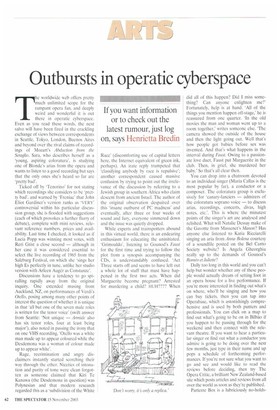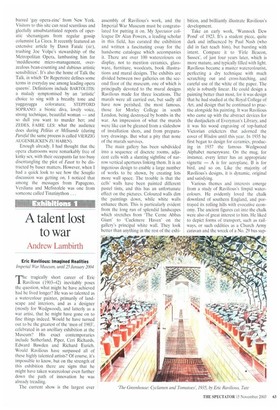Outbursts in operatic cyberspace
If you want information or to check out the latest rumour, just log on, says Henrietta Bredin
The worldwide web offers pretty much unlimited scope for the rampant opera fan, and deeply weird and wonderful it is out there in operatic cyberspace. Even as you read these words, the next salvo will have been fired in the crackling exchange of views between correspondents in Seattle, Tokyo, London, Buenos Aires and beyond over the rival claims of recordings of Mozart's Abduction from the Seraglio. Sara, who describes herself as a 'young, aspiring coloratura', is studying one of Blonde's arias from the opera and wants to listen to a good recording but says that the only ones she's heard so far are 'pretty bad'.
Ticked off by Tenorino' for not stating which recordings she considers to be 'pretty bad', and warned by Treniac' that John Eliot Gardiner's version ranks as 'VERY' controversial within his particular discussion group, she is flooded with suggestions (each of which provokes a further flurry of debate), complete with mini reviews, relevant reference numbers, prices and availability. Last time I checked, it looked as if Lucia Popp was winning most votes, with Reri Grist a close second — although in her case it was considered essential to select the live recording of 1965 from the Salzburg Festival, on which she 'sings her high Es perfectly in tune, unlike her studio version with Arleen Auger as Constanze'.
Discussions have a tendency to go spiralling rapidly away from the original inquiry. One extended musing from Auckland, NZ, on performances of Verdi's Otello, posing among many other points of interest the question of whether it is unique in that 'all but one of the seven male roles is written for the tenor voice' (swift answer from Seattle: 'Not unique — Ann/de also has six tenor roles, four at least being major'), also noted in passing the irony that on one VHS recording, `Otello was a white man made up to appear coloured while the Desdemona was a woman of colour made up to appear white'.
Rage, recrimination and angry disclaimers instantly started scorching their way through the ether. Niceties of intonation and purity of tone were clean forgotten as someone claimed that Kin i Te Kanawa (the Desdernona in question) was Polynesian and that modern research regarded this as a 'subdivision of the White Race' (discomforting use of capital letters here, the Internet equivalent of green ink, perhaps). An irate reply trumpeted that 'classifying anybody by race is repulsive'; another correspondent caused massive confusion by trying to point out the irrelevance of the discussion by referring to a Jewish group in southern Africa who claim descent from ancient Israel. The author of the original observation despaired over this 'insane outburst of PC madness' and eventually, after three or four weeks of sound and fury, everyone simmered down and the issue was quietly dropped.
While experts and trairispotters abound in this virtual world, there is an endearing enthusiasm for educating the uninitiated. 'Grirrioaldo', listening to Gounod's Faust for the first time and trying to follow the plot from a synopsis accompanying the CDs. is understandably confused. 'Act Three starts off and seems to have left out a whole lot of stuff that must have happened in the first two acts. When did Marguerite become pregnant? Arrested for murdering a child? HUH???? When
did all of this happen'? Did I miss something? Can anyone enlighten me?' Fortunately, help is at hand. 'All of the things you mention happen off-stage,' he is reassured from one quarter. 'In the old movies the man and woman went up to a room together,' writes someone else. The camera showed the outside of the house and then the light going out. Well that's how people got babies before sex was invented. And that's what happens in the interval during Faust. Owing to a passionate love duct, Faust put Marguerite in the club. Then, in grief, she murdered her baby.' So that's all clear then.
You can drop into a chatroom devoted to an individual singer (Maria Callas is the most popular by far), a conductor or a composer. The coloratura group is exclusively for 'canary-fanciers — admirers of the coloratura soprano voice — to discuss arias, recordings, concerts, divas, high notes, etc.'. This is where the minutest points of the singer's art are analysed and relished. What will Natalie Dessay make of the Gavotte from Massenet's Manon? Has anyone else listened to Katia Ricciarelli singing an aria from Anna Bolena courtesy of a soundfile posted on the Bel Canto Society website? Is Angela Gheorghiu really up to the demands of Gounod's Romeo et Juliette?
Daily too long in this world and you can't help but wonder whether any of these people would actually dream of setting foot in an opera house for a live performance. If you're more interested in finding out what's on where, who'll be singing and how you can buy tickets, then you can tap into Operabase, which is astonishingly comprehensive and is used by both punters and professionals. You can click on a map to find out what's going to be on in Bilbao if you happen to be passing through for the weekend and then connect with the relevant theatre. If you want to hear a particular singer or find out what a conductor you admire is going to be doing over the next few months, just type in their name and up pops a schedule of forthcoming performances. If you're not sure what you want to go and see and would like to read the reviews before deciding, then try The Opera Critic, a brilliant New Zealand-based site which posts articles and reviews from all over the world as soon as they're published.
Parterre Box is a lubriciously no-holds barred 'gay opera-zine' from New York. Visitors to this site can read scurrilous and gleefully unsubstantiated reports of operatic shenanigans from regular gossip columnist La Cieca. It recently featured an extensive article by Dawn Fatale (sic), trashing Joe Volpe's stewardship of the Metropolitan Opera, lambasting him for 'meddlesome micro-management, overzealous bean-counting and dubious artistic sensibilities'. It's also the home of Talk the Talk, in which 'Dr Repertoire defines some terms in everyday use among leading opera queens'. Definitions include BARTOLIT1S: a malady symptomised by an 'artistic' choice to sing with a breathy tone and yuggayugga coloratura; STEPFORD SOPRANO: a bionic diva, lovely voice, strong technique, beautiful woman — and so dull you want to murder her; and ZEDES, FAIRE LES: what the audience does during Pelleas et Melisande (during Parsifal the same process is called VIERZIG AUGENBLICKEN ZU HABEN).
Enough already. I had thought that the opera chatrooms were remarkably free of kinky sex, with their occupants far too busy disentangling the plot of Faust to be distracted by baser matters. However, when I had a quick look to see how the Seraglio discussion was getting on, I noticed that among the messages from Papageno, Verdiana and Mefistofele was one from someone called Tinatinython . .



























































































 Previous page
Previous page